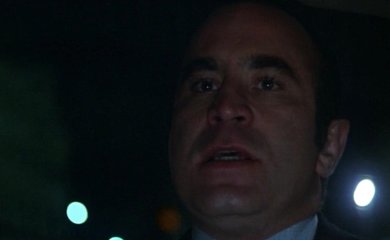Harold Shand is dead.
We always knew it in our hearts when the future James Bond drove him off at gunpoint. We always knew it but we couldn’t quite believe. Men like Shand don’t die. They can’t. Surely a gangster of Shand’s calibre, that vicious drive, that spiteful verve could wrench that car door open, spring free of his fate and plot the bloody murder of his tormentors? Movies end that way for children, definite, never accepting defeat.
“The Long Good Friday” told a generation to how to put away childish things. Accept defeat. Mourn for our heroes, even if they were right ‘orrible, Dickensian bastards. Shand’s face is a picture of cruel delight, dancing with rage and Shakespearean tragedy as he slowly faces up to the flaws in his character that will bring him down. The petty need for revenge, the desire to usurp the class system, and the greed that ultimately betrays his Cockney roots. God how we loved him when he struts supersonic from a transatlantic Concorde. Look at him now.
Teeth like razors, pearly and orca jut proud like the White Cliffs of Dover. No erosion here just defiance and acceptance, the taste of an ear ripped out in a bar fight. No one muscles Shand, threatens Shand, kills Shand. He is immortal like Churchill, like Cagney, Gene Kelly. That low centre of gravity, those knuckled fists of wrought iron, that bulldog skull, armour plated with a million incarnadine stories. Shand’s eyes are greasy black orbs, ready for his place in hell, he had it all but he couldn’t escape his working class conditioning. He is Thatcher’s Robber Baron, canon fodder for her free market rampage.
All the trappings of class are dust, the yacht, the casino, and the property race before him and then away from him. How did Shand lose his upper-class squeeze? When did all of his cronies disappear? How much did he spend on bent coppers to turn the other way? Indulge his reign as king of London. Shand knows his thread is about to be cut and secretly he admires his killers, it was exactly the same thing he used to do before he became civilised and legitimate. He cannot begrudge them that. Shand was too honest to be truly Machiavellian. Well-played gents.
And there you have it, Shand’s silent soliloquy. The most glorious close up in all cinema, a testament to the hairs on the back of your neck. The greatest actors allow their brains to be filmed and allow you to relive their greatest moments for eternity. Harold Shand is finally dead but we will never forget his lethal genius-we can’t. And those final lines echo forever, “What I’m looking for is someone who can contribute to what England has given to the world: culture, sophistication, genius. A little bit more than an ‘ot dog, know what I mean?”
Harold Shand is dead. Long live Bob Hoskins.

